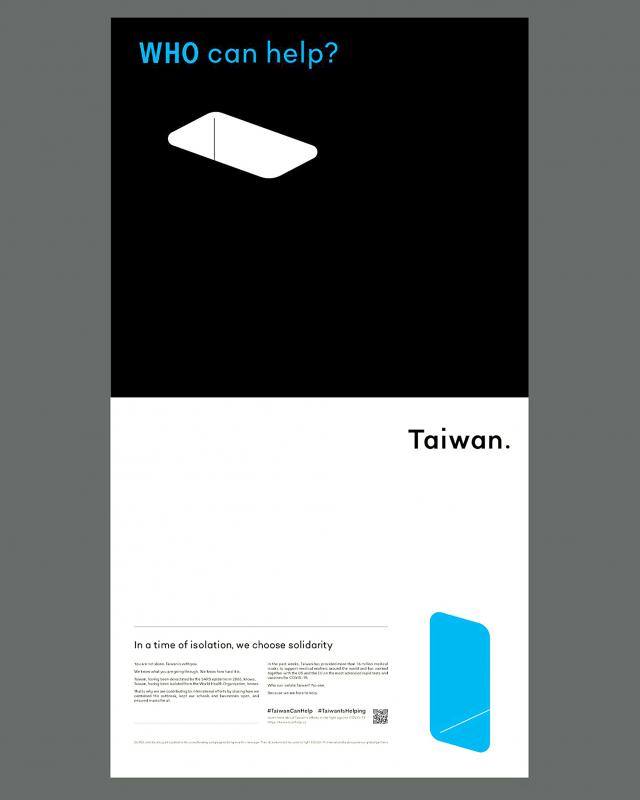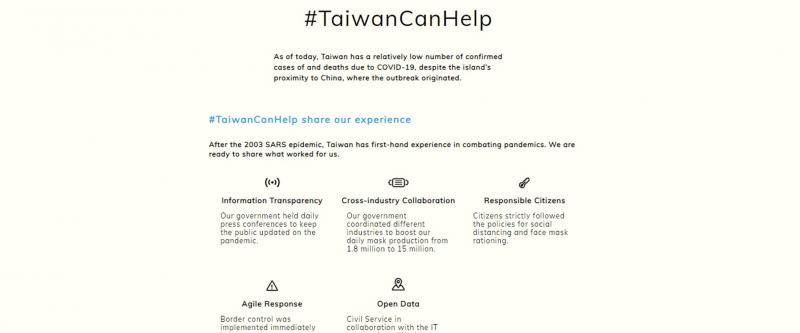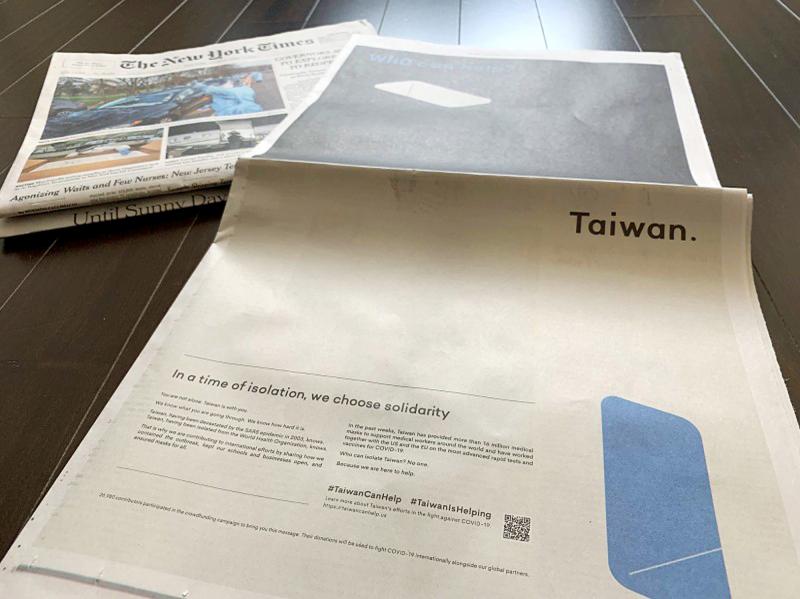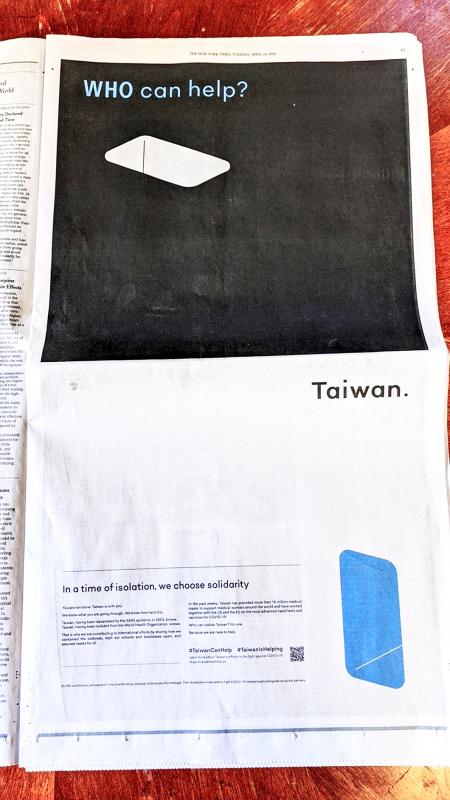Lin Tzu-yi (林祖儀) had already placed the order for a full page ad in the New York Times when the criticisms began. It was supposed to be due on Saturday for Monday’s paper, but he and other organizers had to delay the ad to address the concerns.
The original idea was to crowdfund an immediate response to WHO Director-General Tedros Adhanom Ghebreyesus publicly accusing Taiwan of launching a “racist campaign” against him. Tedros’ comments came in the midst of the COVID-19 pandemic. Taiwan has done a stellar job in containing the virus despite still being barred from the WHO.
“At first, we just wanted to strike back at Tedros,” Lin tells the Taipei Times.

Screengrab from https://taiwancanhelp.us/
Within hours, the campaign raised over NT$19 million, nearly five times its goal of NT$4 million, with 26,980 people donating and, at one point, crashing the Web site zeczec.com, the crowdfunding platform. Although people publicly questioning the effectiveness of the ad and the timing of it in the middle of a global pandemic, the team pushed through while closely interacting with its supporters, many of whom felt it would make Taiwan seem petty to just sling mud back at Tedros and the organization he heads.
Thousands of messages and comments later, the ad that appeared yesterday in both print and online did not mention Tedros at all, instead invoking the government’s favorite phrase “Taiwan Can Help” while highlighting Taiwan’s isolation from the WHO and commenting on how the nation can share its expertise in fighting the pandemic. An interactive Web site, www.taiwancanhelp.us, was also launched, and Lin says this is just the beginning as the team will collaborate with other interested parties to continue to raise international awareness for Taiwan.
Lin says the surplus cash will be divided between international and domestic COVID-19 relief efforts as well as additional Internet advertising.

Screengrab from https://taiwancanhelp.us/
“The strength of the few of us organizers is very limited,” Lin says in response to the criticism. “There are surely better ways to go about this that we haven’t thought of. I hope that more people can pitch in, as there’s a lot more to do. This is just the beginning.”
TONING IT DOWN
Due to the political influence of China, Taiwan is not a member of the WHO and has been barred from attending the World Health Assembly since the Democratic Progressive Party took power in 2016.

Photo: CNA
Taiwan’s relationship with the WHO worsened when the pandemic broke out and the nation continued to be shut out of the organization despite its success in combating the virus.
Taiwan’s political isolation is old news, but netizens seemed especially annoyed when Tedros accused Taiwan of racist campaigns against him during a press conference in Geneva on Wednesday last week. President Tsai Ing-wen (蔡英文) not only slammed the claims as baseless but invited him to visit the country. Netizens followed suit and began posting about Taiwan’s positive qualities such as its democracy, LGBTQ rights, food and scenery under the hashtag #ThisAttackComesFromTaiwan.
Lin was also one of the organizers behind the crowdfunded full page ad that appeared in the New York Times in March 2014 to alert the world about the student-led Sunflower movement protests. That time, he says the process went smoothly as it was a more straightforward issue about Taiwan’s visibility and democracy.

Photo by reader via the Liberty Times
The first draft of what became the current ad was a long letter addressed to Tedros, directly commenting on his accusations, his organization’s recent missteps as well as its isolation of Taiwan. While many pitched in, the ad also drew criticism on the crowdfunding page as people commented that it would cause the opposite effect by making Taiwan look like it was boasting.
Others questioned why the international community would care about Taiwan’s beef with Tedros, and some were unhappy that the ad claimed to come from “the people of Taiwan.” The language was changed accordingly to just represent the 26,890 contributors.
“In the end, we realized that we didn’t need to get into a verbal slugfest with Tedros,” popular YouTuber Ray Du (督省瑞) and one of the main organizers of the campaign, wrote yesterday.
The team then put out two versions of a gentler, much shorter letter that emphasized that “Taiwan can help” — a slogan that the government has been using over the past few years to combat the nation’s political marginalization.
They let the contributors vote on the final version.
“In 2014, there was much less dispute,” Lin says. “Most of the comments were on issues like aesthetics. This time, there was non-stop interaction and exchanges with the supporters. [The crowdfunding platform] told us this is the first time they’ve seen so much discussion and input go into a project.”
LINGERING QUESTIONS
However, many continued to question the effectiveness of pouring so much money into a print ad, despite its supporters — including Lin — believing that it is a worthy venture for Taiwan’s international stature and visibility. Some wondered if it would be a better idea to use all the funds toward helping other countries battle the coronavirus.
One of the main issues was why people in the US would care about Taiwan’s exclusion from the WHO when their lives are at risk due to the pandemic, as well as the declining influence of print media. How many people would the ad actually reach?
Taiwan’s success battling COVID-19 and its problems with the WHO have been covered in the international media. To cite just a few examples, the New York Times reported on Taiwan’s protest against Tedros’ accusations last week and CNN on Tuesday ran a piece on how countries with female leaders seem to find more success in battling COVID-19 — leading the story with Taiwan and its recent donation of face masks to various countries in need.
Lin says that the New York Times is still one of the world’s more reputable publications, especially to those in power, and that his team will also place online advertising in different publications as well as keep the taiwancanhelp.us Web site running. He stresses that the print ad is just the beginning, and hopes this turns into a vibrant movement.
Tsai has thanked the 26,890 contributors for their efforts, and former US ambassador to the UN Samantha Power posted it to Twitter, calling it a “powerful ad” and emphasized that “Taiwan has been fighting [COVID-19] alone.”
And the ad actually garnered a direct response from the WHO, claiming through a 13-point statement that the organization has maintained regular technical exchanges with Taiwanese health authorities over several decades.
Taiwan’s representative office in Geneva on Tuesday criticized the statement as misleading the world to believe that WHO has maintained full exchanges with Taiwan.

Taiwan has next to no political engagement in Myanmar, either with the ruling military junta nor the dozens of armed groups who’ve in the last five years taken over around two-thirds of the nation’s territory in a sprawling, patchwork civil war. But early last month, the leader of one relatively minor Burmese revolutionary faction, General Nerdah Bomya, who is also an alleged war criminal, made a low key visit to Taipei, where he met with a member of President William Lai’s (賴清德) staff, a retired Taiwanese military official and several academics. “I feel like Taiwan is a good example of

March 2 to March 8 Gunfire rang out along the shore of the frontline island of Lieyu (烈嶼) on a foggy afternoon on March 7, 1987. By the time it was over, about 20 unarmed Vietnamese refugees — men, women, elderly and children — were dead. They were hastily buried, followed by decades of silence. Months later, opposition politicians and journalists tried to uncover what had happened, but conflicting accounts only deepened the confusion. One version suggested that government troops had mistakenly killed their own operatives attempting to return home from Vietnam. The military maintained that the

Taipei Mayor Chiang Wan-an (蔣萬安) announced last week a city policy to get businesses to reduce working hours to seven hours per day for employees with children 12 and under at home. The city promised to subsidize 80 percent of the employees’ wage loss. Taipei can do this, since the Celestial Dragon Kingdom (天龍國), as it is sardonically known to the denizens of Taiwan’s less fortunate regions, has an outsize grip on the government budget. Like most subsidies, this will likely have little effect on Taiwan’s catastrophic birth rates, though it may be a relief to the shrinking number of

Since its formation almost 15 years ago, Kaohsiung rock band Elephant Gym (大象體操) has shattered every assumption about contemporary popular music, and their story is now on screen in a documentary titled More Real Than Dreams. It’s an unlikely success story that says a lot about young people in Taiwan — and beyond. For a start, their sound is analog. In the film, guitarist Tell Chang (張凱翔) proudly says: “There is no AI in our sound.” His sister, bass player KT Chang (張凱婷) is the true frontwoman — less for her singing abilities than for her thunderous sound on the instrument. Fast like